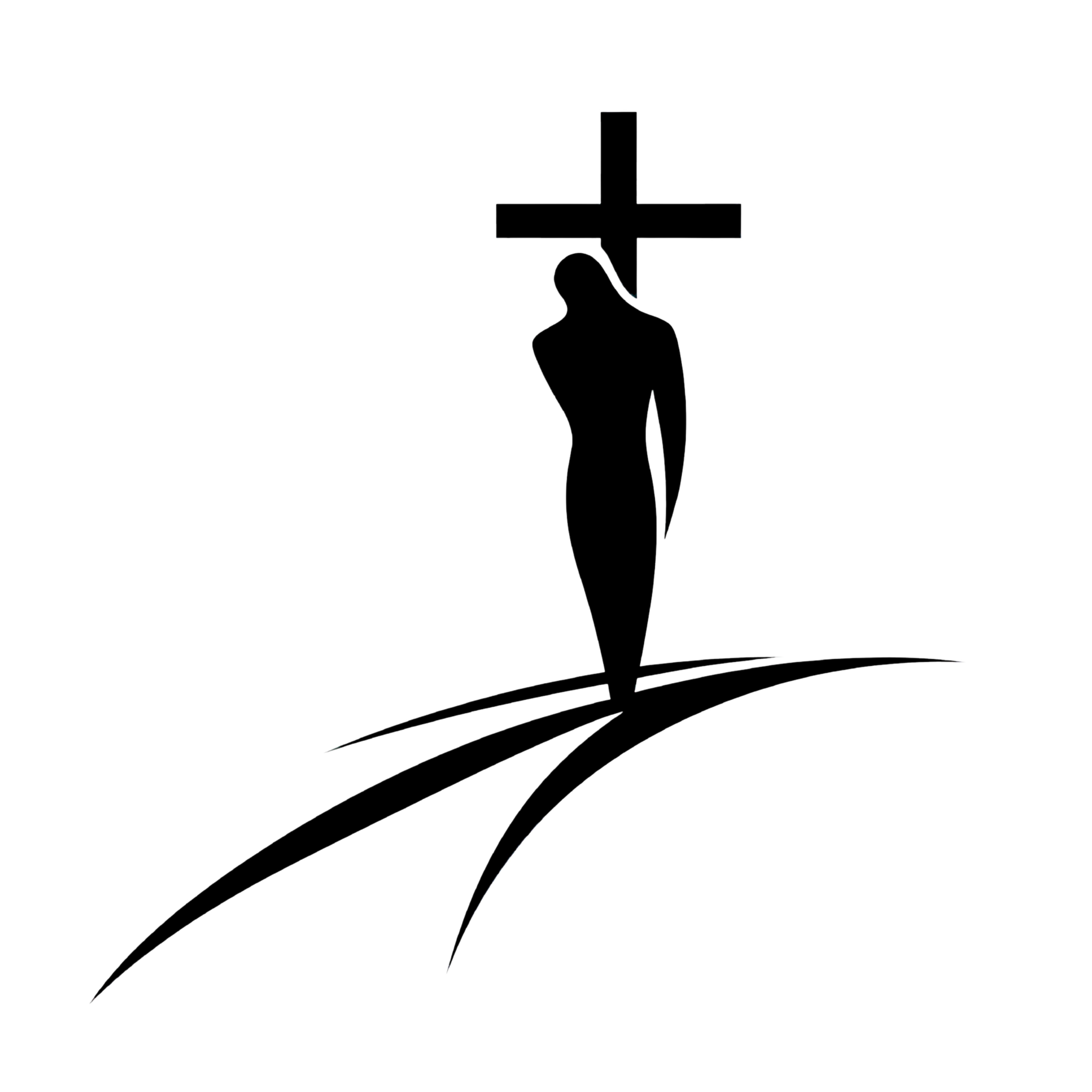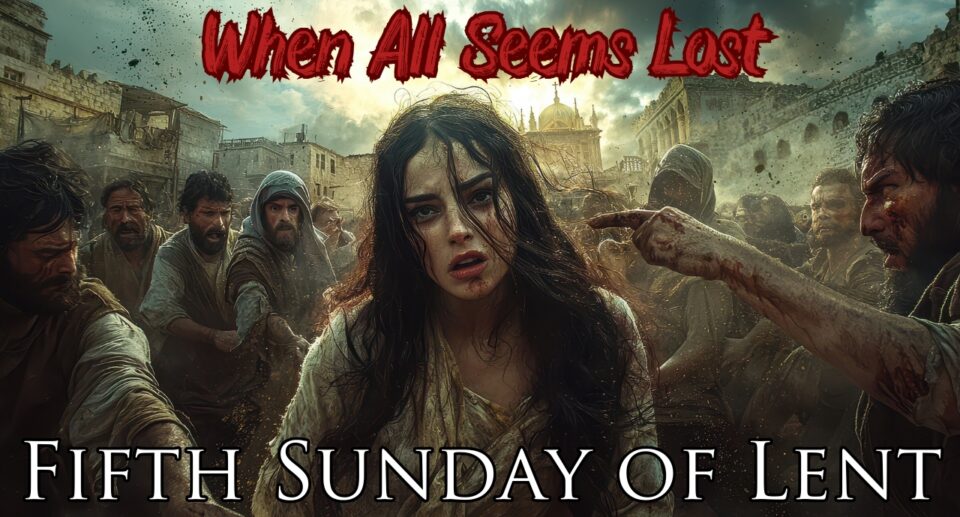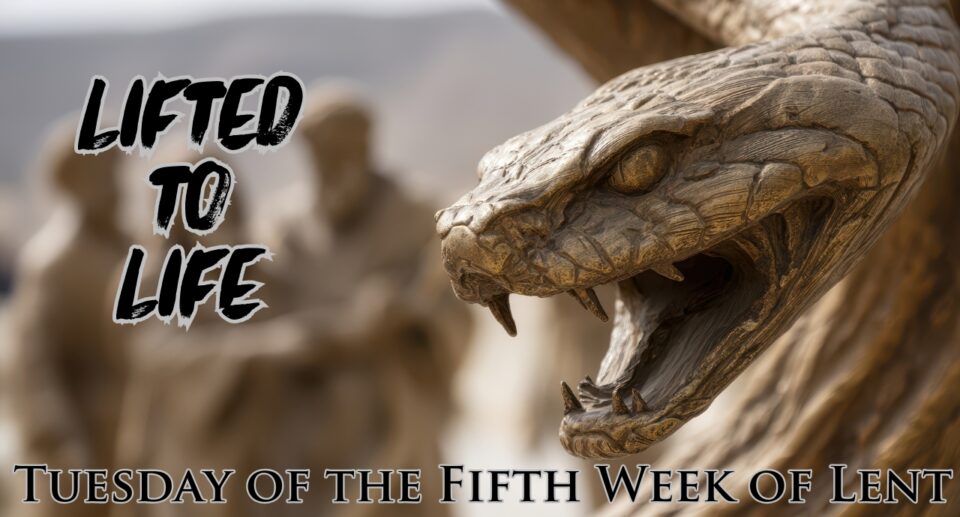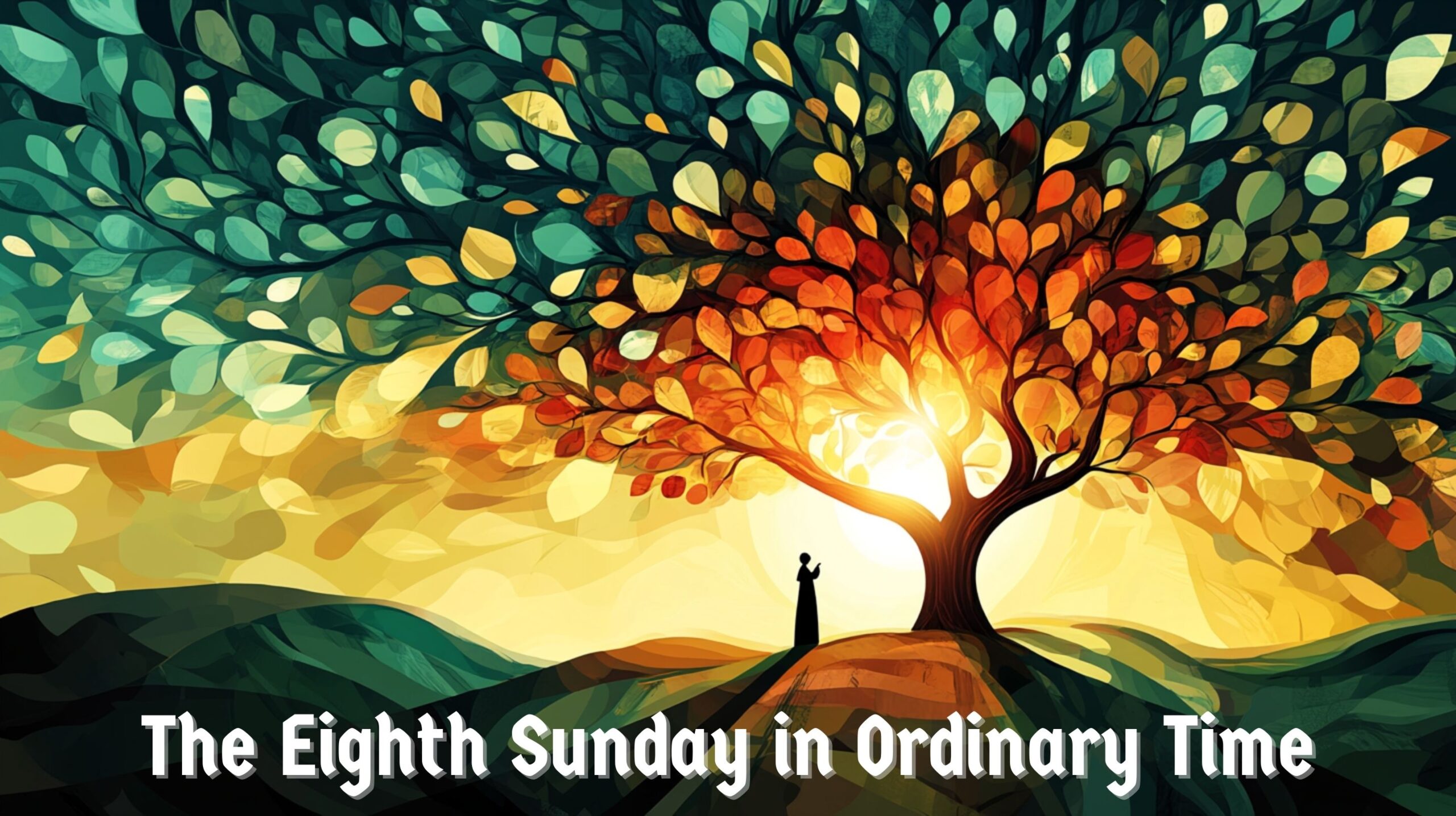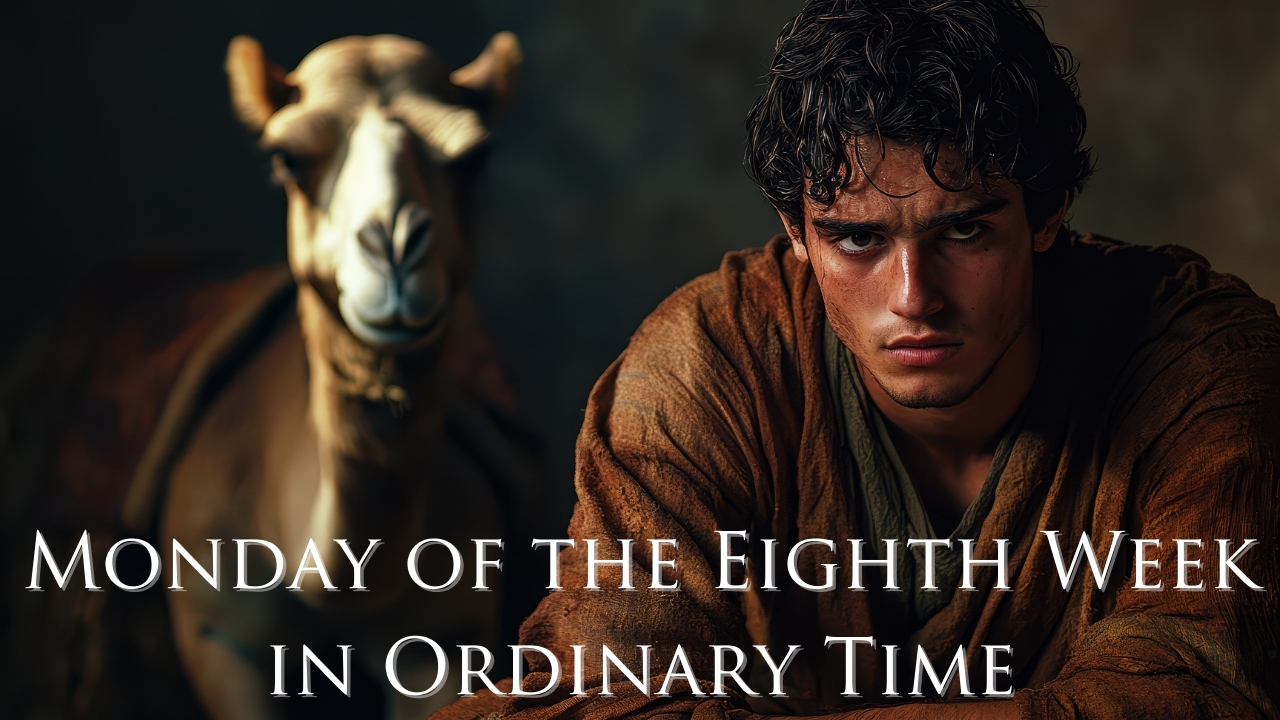Light in Darkness: Finding Truth When Justice Fails | Daily Readings | April 7, 2025
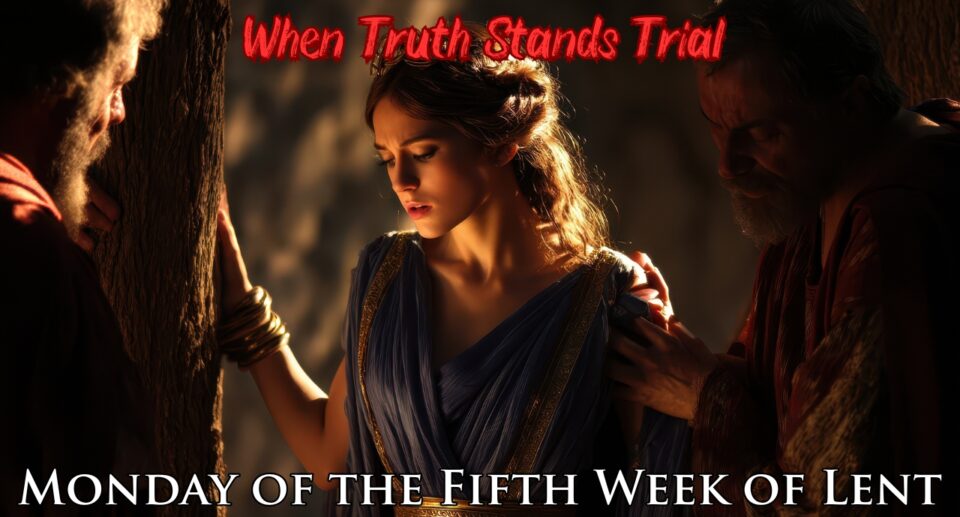
When false accusations threaten to destroy an innocent woman’s life, one voice breaks through the darkness. Today’s powerful Lenten reflection explores the dramatic story of Susanna and how it illuminates Jesus’s declaration: “I am the light of the world.”
Through this reflection, you’ll discover:
- How to recognize God’s presence even in seeming abandonment
- The courage required to stand for truth when everyone else chooses convenience
- Why divine justice transcends human legal systems
- How to become a bearer of Christ’s light in a world full of shadows
Readings covered: Daniel 13:1-9, 15-17, 19-30, 33-62; Psalm 23:1-3a, 3b-4, 5, 6; John 8:12-20
Perfect for anyone seeking deeper meaning during Lent, facing unjust circumstances, or wanting to better understand how ancient biblical wisdom applies to today’s complex moral challenges.
Light in Darkness: Finding Truth When Justice Fails
The garden lay silent in the shimmering heat of afternoon. Susanna’s footsteps whispered against the stone path as she moved between cypress trees, their shadows painting cool stripes across her face. She breathed in the scent of jasmine and closed her eyes, savoring this rare moment of solitude.
“Everyone has gone now,” she whispered to herself. “Just me and the garden.”
She was wrong.
Four eyes watched from behind the ancient olive trees. Two mouths twisted into hungry smiles. Two hearts darkened with desire. The elders—appointed judges, respected men whose gray hair and stooped shoulders commanded reverence—had transformed from shepherds of justice into predators.
Their whispers slithered through the garden like serpents. “Now.”
What happens when those entrusted with upholding truth become its greatest enemies? What happens when innocence stands trial before corruption? When light seems extinguished by darkness?
The story of Susanna from today’s first reading unfolds like a gripping thriller, yet with profound spiritual implications that reach across thousands of years to touch our lives today. This narrative from Daniel isn’t merely an ancient tale—it’s a mirror reflecting our own struggles with truth, justice, and faith in a world that often seems to reward the corrupt.
The two elders approach Susanna with their ultimatum: submit to their desires or be destroyed by false accusation. Her response reveals everything about her character: “I am hemmed in on all sides… yet it is better for me to fall into your power without guilt than to sin before the Lord.” In that moment of impossible choice, Susanna chooses integrity over safety, truth over compromise.
When she refuses and screams, the elders execute their plan perfectly. They shout accusations. Servants come running. A respected woman’s reputation crumbles in seconds. By nightfall, Susanna stands condemned, awaiting execution.
Feel the weight of that moment. The anguish of her husband, Joakim. The confusion of her children. The tears of her parents who raised her to fear God, now watching as that very faith seems to have abandoned her to death. The scripture tells us, “All her relatives and the onlookers were weeping.”
Have you ever felt abandoned by the very principles you’ve built your life upon? Have you watched as lies seemed to triumph over truth? As darkness smothered light?
This is where our Psalm today speaks with haunting relevance: “Even though I walk through the valley of the shadow of death, I will fear no evil, for you are with me.”
Susanna walks through that valley, literally condemned to death. Her reputation destroyed. Her life forfeit. Where is her shepherd now?
He arrives in the most unexpected form—a young boy named Daniel, whose name means “God is my judge.” When the entire community accepts the elders’ testimony without question, Daniel alone stands against the current of groupthink and mob justice.
“Are you such fools, O children of Israel!” he cries out. “To condemn a daughter of Israel without examination and without knowing the truth?”
In that electric moment, a single voice of truth pierces the darkness. Daniel insists on questioning the elders separately, exposing their contradictory testimony. Under which tree did this alleged sin occur? One says a mastic tree, the other an oak. The lie collapses under its own weight.
This moment of revelation connects directly to Jesus’s declaration in today’s Gospel: “I am the light of the world. Whoever follows me will not walk in darkness but will have the light of life.”
Light reveals what darkness hides. Light exposes contradiction and falsehood. Light illuminates the path forward when all seems lost.
But the connection between our readings goes deeper still.
Notice how the Pharisees immediately attack Jesus’s testimony: “You testify on your own behalf, so your testimony cannot be verified.” They question his authority just as Susanna’s integrity was questioned. They attempt to discredit truth by attacking its messenger.
Jesus responds with words that echo the very heart of Susanna’s story: “You judge by appearances… Even if I should judge, my judgment is valid, because I am not alone: the Father who sent me is with me.”
This is the promise embedded in Psalm 23: “Your rod and your staff comfort me… You spread a table before me in the sight of my enemies.”
When human justice fails, divine justice remains. When we stand alone before our accusers, we are never truly alone. When darkness seems to have won, light still burns.
Picture Susanna in that moment when Daniel exposes the elders’ lies. The crowd’s murmurs rising to shouts. The elders’ faces contorting with panic. The slow dawning of realization across the community. Truth reasserting itself like the sun breaking through storm clouds.
The narrative concludes with swift justice: “They rose up against the two elders, for by their own words Daniel had convicted them of perjury… They put them to death. Thus was innocent blood spared that day.”
But what does this ancient story mean for us, here and now, in the fifth week of Lent, 2025?
It means everything.
How many Susannas exist today? People falsely accused, facing the court of public opinion where accusations alone can destroy lives. How many corrupt “elders” use their authority to exploit rather than protect? How many communities rush to judgment without seeking deeper truth?
And how often do we find ourselves in each of these roles?
Have we been Susanna—choosing integrity even when it costs us everything? Have we been the elders—using our position to serve our desires rather than truth? Have we been the crowd—accepting accusations without question because they came from “authority”? Or have we been Daniel—willing to stand alone for truth when everyone else chooses convenience?
As we draw closer to Holy Week, these readings invite us to examine where darkness has infiltrated our own lives and communities.
Maybe you’re facing your own version of Susanna’s garden—a situation where doing the right thing seems guaranteed to bring suffering. The promotion that requires ethical compromise. The relationship that demands you stay silent about important truths. The social circle that expects you to participate in the destruction of another’s reputation.
Or perhaps you’re in a Daniel moment—witnessing injustice and feeling that internal nudge to speak up when everyone else remains silent. The courage to break from the crowd rarely comes without cost.
Jesus doesn’t promise his followers an easy path. “The light of life” doesn’t mean the darkness disappears—it means we no longer walk through it alone or without direction.
This week, I invite you to consider three practical ways to live these readings:
First, examine where you might be rushing to judgment without full investigation. Are there situations or people you’ve condemned based on partial information or the testimony of others? What would it mean to seek fuller truth?
Second, identify where you can be a voice for those whose testimonies are dismissed. Who in your community, workplace, or family needs someone to say, like Daniel, “Let’s look at this more carefully”?
Third, cultivate practices that keep you connected to the divine shepherd. The confidence to stand for truth like Susanna and Daniel comes from knowing God is with you, even in the valley of death. Daily prayer, scripture reading, and authentic community create the foundation that makes moral courage possible.
The story of Susanna concludes with justice restored, but not before an innocent woman faces the very real possibility of death. Our journey with Christ follows a similar pattern—there is resurrection, but first comes the cross. Vindication, but first suffering. Light, but not without passing through darkness.
As we continue through this Fifth Week of Lent, may we walk confidently even through shadowed valleys, knowing our Shepherd is with us. May we recognize Jesus as the light that illuminates our path when human systems fail us. And may we, like Daniel, have the courage to speak truth when lies would be more convenient.
For the God who prepared a table for Susanna in the presence of her enemies is the same God who spreads a feast before us, even in our darkest hours. The same God who sent a young boy to speak truth when a community had embraced lies is the God who sent Jesus to be light in our darkness. The same God who guided Susanna “along right paths” guides us still.
And in a world that often feels consumed by shadow, that is news worth clinging to.
